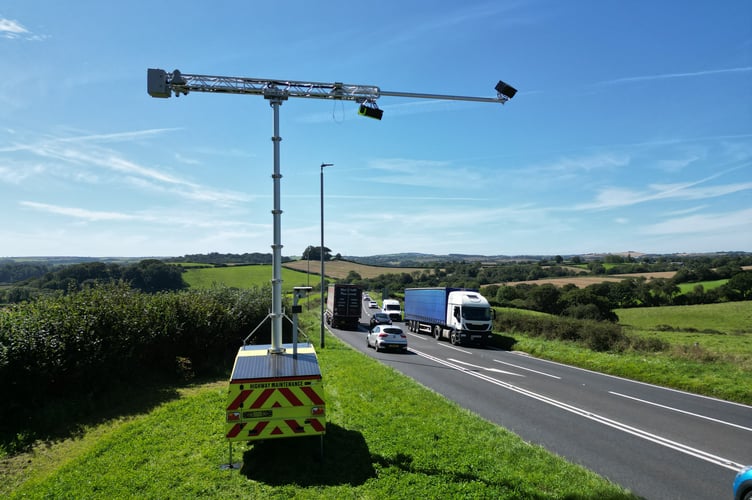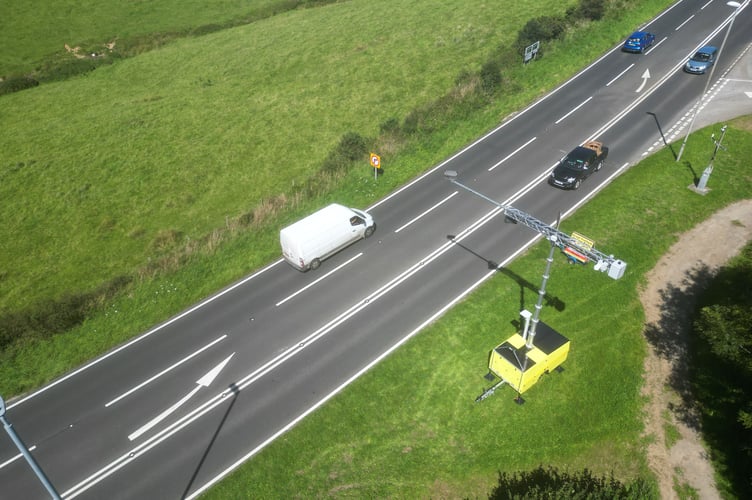FREESTANDING AI cameras which detect seatbelt and mobile phone offences are now active on roads across Devon and Cornwall.
Three Acusensus camera systems are currently operational across the region, with specific locations changing regularly during the course of the 12-month project.
It is the first long-term use of this state-of-the-art equipment outside Australia, and is being used to monitor locations within Devon and Cornwall’s 13,500-mile road network.
The Acusensus camera system uses two cameras to take high-speed front-facing and overhead images of vehicles and uses AI to detect any potential offences. The images are then verified in the UK by a human to determine whether an offence has taken place.
If an offence has been correctly identified, the driver will either be sent a warning letter or a notice of intended prosecution, depending on the severity.

A range of locations will be monitored and include different speed limits, road characteristics and daily number of vehicles to help identify where the greatest risk for these behaviours exists.
Devon and Cornwall Police, who are overseeing the project, have previously trialled the Acusensus technology in both 2022 and 2023. Earlier this year, during a two-week deployment in February and March, the system detected 408 seatbelt and 162 mobile phone offences.
Adrian Leisk, Head of Road Safety for Devon and Cornwall Police, said: “The vast majority of drivers in Devon and Cornwall are safe, respectful and conscientious motorists – but we know mobile phone distraction and not wearing a seatbelt are a serious danger to all road users.
“Around a third of all fatal collisions nationally involve someone who wasn’t wearing a seatbelt – and not wearing one means you are twice as likely to die in the event of a serious collision.
“With regards to those who use mobile phones while behind the wheel, we hope these cameras will send a clear message – you will get caught.

“Whether it’s by the Acusensus cameras, a police officer or on publicly witnessed video footage submitted through Op Snap, the result will be the same and you could end up with a hefty fine and six penalty points – which could be enough to cost some drivers their license and livelihood.
“It’s just not worth it. Before you start your journey, put your phone away in the glovebox or somewhere you cannot reach it so the temptation is not there. If it’s an emergency, make sure you pull in and stop the car before making that call.”
Alison Hernandez, Police and Crime Commissioner for Devon, Cornwall and the Isles of Scilly, is also chairman of the Vision Zero South West road safety partnership.
Commissioner Hernandez said: “You are four times more likely to crash when using a phone whilst driving, which is why it is illegal.

“By embracing new technology such as the Acusensus system, we have the opportunity to improve driver behaviour and consequently make our roads safer for everyone.”
Dr Jamie Uff, Technical Director with AECOM who helped to deliver the Acusensus system, said: “Despite the often-reported dangers of distracted driving and failing to wear seatbelts, the numbers of people killed or seriously injured as a result of these behaviours remain high.
“The technology AECOM is deploying makes detection straightforward and is providing valuable insight to the police and policy makers on the current level of road user behaviour.”
Geoff Collins, General Manager for Acusensus UK said: “This is a significant milestone for UK road safety. Our technology is now being used to directly deal with poor driving behaviours, helping to break those bad habits so making our roads safer for everyone.”



